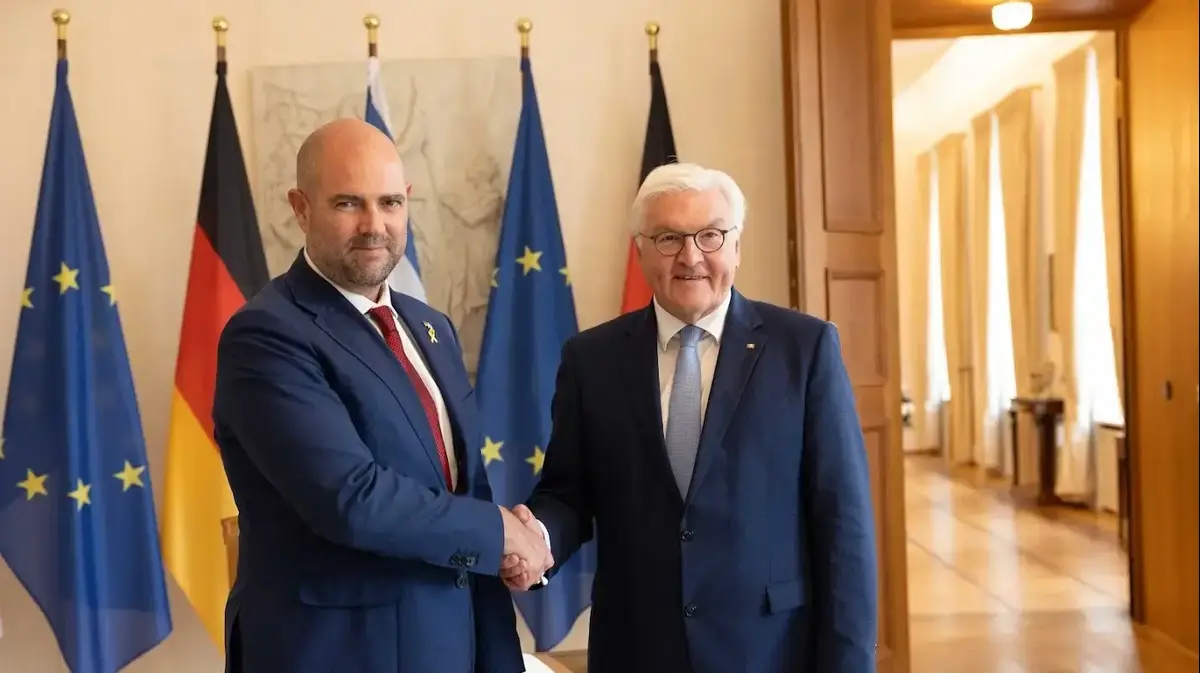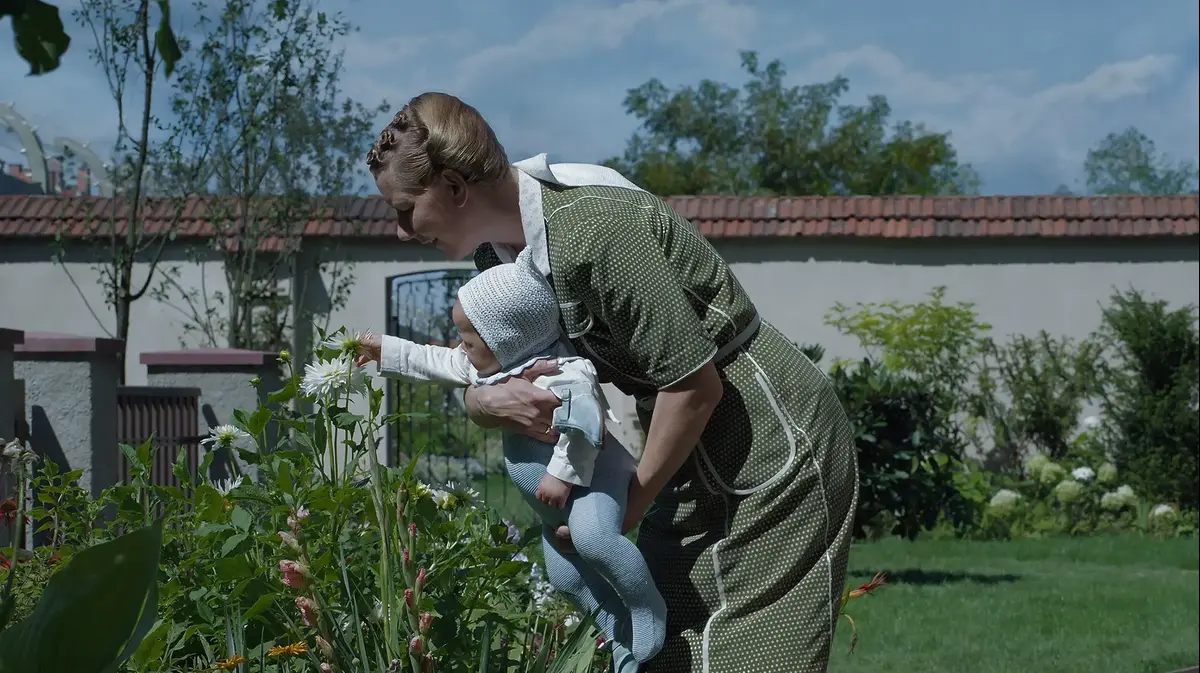Enlarge image
Speaker of the Knesset Mickey Levy, President of the Bundestag Bärbel Bas in the Bundestag: "We choose life anew every day"
Photo: Sean Gallup/Getty Images
At the end of his speech in the Bundestag, Mickey Levy bursts into tears.
The President of the Israeli Parliament has just read the Kaddish, the Jewish prayer for sanctification, to commemorate the victims of the Shoah.
"Toda," Levy pushes after the parliamentarians present, "thank you," then he buries his face in his hands, crying.
Those present in the Bundestag stand up and applaud for several minutes.
Even 77 years after the end of the Second World War, it is not a matter of course that a Jew prays in the German parliament and lets his tears flow freely.
But it is part of a healing.
On January 27, 1945, the Red Army liberated the Auschwitz-Birkenau concentration and extermination camp.
Auschwitz.
The word has become a central part of German identity, like no other word it stands for remembering, for not forgetting.
The National Socialists had murdered more than a million Jews here.
The mass murder was bureaucratically planned, and to this day Auschwitz is one of the most depressing places of the Shoah.
Since 1996, the Bundestag has commemorated the liberation with an hour of remembrance.
Bundestag President Bärbel Bas (SPD) calls it a “day of shame” this Thursday, at the opening of the memorial act.
Bas says that none of those present raised any objections to the planning of the mass murder at the Wannsee Conference.
The Wannsee Conference stands for "a state in which injustice became justice", supported by people "who became murderers and accomplices".
The fact that hatred and annihilation came from the heart of German society and was carried by it – days like January 27 are still necessary to this day to remember.
History has not passed, it must be understood anew every day.
Democracy must be defended anew every day.
But how do you commemorate without getting lost in rituals?
That's going to be a big question in the Bundestag.
"A culture of remembrance cannot be decreed from above," says Bas.
Nor should it be limited to "state rituals" such as commemoration.
»Our culture of remembrance, which is respected by many, only stays alive if we keep asking questions of history.«
memories of a survivor
Remembrance also stands for "construction," says Knesset President Levy later in his speech.
Germany and Israel have built a bridge, both know about the indispensable need to continue working together to preserve democracy.
"We choose life anew every day," Levy said.
The eternally serious warning of the Holocaust reads: "Never again.
Never again."
A look at the present shows that this »never again« must be emphasized even after 77 years.
Anti-Semitism and racism are alive in Germany.
In Halle, a right-wing extremist tried to storm a synagogue, in Hanau another killed nine people with a migration background.
A third of Germans believe that the Jews have too much influence.
Anti-Semitic conspiracy myths are being spread at demonstrations against the corona measures and online.
The President of the Bundestag says that the corona pandemic has become “like a fire accelerator” for hatred of Jews in Germany in the past two years.
"Anti-Semitism is among us."
"Unfortunately, this cancer has woken up again," says Inge Auerbacher about the hatred of Jews in her speech.
It is commonplace again in many countries around the world, “including Germany”.
Inge Auerbacher is a survivor of the Shoah.
The 87-year-old New Yorker comes from Kippenheim on the edge of the Black Forest and survived the Theresienstadt concentration camp as a child.
In the Bundestag she talks about her history, about her memories.
"We were greeted by the yelling of the guards," Auerbacher recalls about the arrival in Theresienstadt.
She speaks of "Nazi hooligans" who beat her and her family.
The only ways out were: gas chambers, suicide or starvation.
At the age of seven her childhood was over and a life of fear began.
The girl survived and emigrated to the United States with her parents after the war.
Now Auerbacher is returning with a message.
“Hate of people is something terrible,” she says at the end of her speech.
“We were all born brothers and sisters.
My deepest wish is the reconciliation of all people.«
During her speech in the Bundestag, Auerbacher is only a few meters away from the AfD parliamentary group.
Representatives of the partly right-wing extremist party derided the commemoration in the past as a "guilt cult" and National Socialism as "bird shit of German history".
But evil has long ceased to be trivialized in words.
The pandemic shows how words are turning into action.
Vaccination opponents today mock the victims of the Shoah on their "walks" with the "Unvaccinated" Stars of David sewn on.
AfD MPs are in the front rows on these often illegal “walks” against corona policy, which are repeatedly interspersed with violent attacks.
more on the subject
Corona restrictions in the Bundestag: Does the 2G plus rule discriminate against unvaccinated MPs? An interview by Marc Röhlig
On the other hand, many AfD MPs cannot attend the commemoration day in the Bundestag: the current hygiene rules of the house only allow those who have been vaccinated or those who have recovered to take part in extra-parliamentary events.
This also applies to the stands, where the unvaccinated AfD parliamentarians are otherwise allowed to take part in the regular plenary sessions.
The right-wing vaccination refusers have to stay outside for such an important commemoration, and an urgent application by the AfD parliamentary group to the Federal Constitutional Court against the 2G-Plus rules was rejected.
Important reminders of the memorial day go unheeded for some.
"Courage to Intolerance"
"Democracy doesn't have a seal of eternity," says SPD politician Bas.
Freedom and democracy depend on committed citizens, "it depends on all of us." Against those who trample on democracy, one must also show "courage to be intolerable," says Bas then indirectly to the AfD parliamentary group: " If right-wing extremists, historical revisionists and nationalists celebrate election successes, then that is not an alarm signal, then it is high time to act.«
The deputies in the hall applaud in agreement.
In the ranks of the thinned out AfD parliamentary group, some parliamentarians only hesitantly join in the applause.
Others, including parliamentary group leader Alice Weidel, fold their arms.
Memorial Day on January 27 is not a ritual.
He is responsibility.






/cloudfront-eu-central-1.images.arcpublishing.com/prisa/QMMLZZZRT5DBBKJ3BCMUK42HQQ.jpg)








